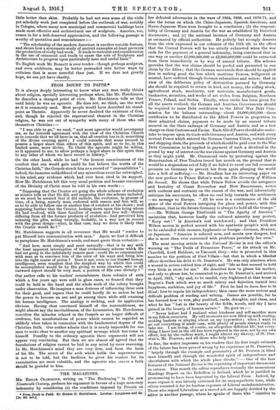FROM DOUBT TO FAITH.*
IT is always deeply interesting to know what any man really thinks about religion, specially interesting perhaps when, hie Mr. Hutchinson, he describes a changed point of view. Mr. Hutchinson tells us that until lately he was an agnostic. He does not, we think, use the word as it is commonly used. Most people would have described his stand- point as Theistic. Apparently he never doubted the existence of God, and, though he rejected the supernatural element in the Christian religion, he was not out of sympathy with many of those who call themselves Christian :- " I was able to go," we read, " and most agnostics would accompany me, so far towards agreement with the view of the Christian Church as to concede that we all have in us, that all creation has in it, something of the divine creating spirit ; I could concede that some seemed to possess a larger share than others of this spirit, and so to be, in this limited sense, more divine. To Christ the agnostic might be willing, as it appeared to me, to allow perhaps a larger share in this spirit than to any other of whom we have record in history."
On the other hand, while he had "the keenest consciousness of the comfort that one would gain could he but believe the truths of the Christian faith," the Gospels struck him as a record of " impossibilities " ; indeed, the immense unlikelihood of any miraculous event far outweighed,
to his mind, any, evidence which had ever been cited in its support. How Mr. Hutchinson left this very usual position and became convinced of the Divinity of Christ must be told in his own words :-
" Supposing that the Creator set going the whole scheme of evolution as science tells us that He did, and supposing that the scheme included, as we must be assured that it did include, the evolution, in process of time, of a being, namely man, endowed with reason and free will, so as to bo able to follow one or another line of conduct at his choice ; and supposing further that the Creator, looking down upon this being whom He had evolved, with these faculties of reason and free will—therein differing from all the former products of evolution—had perceived him misusing the gifts, acting wrongly, foolishly, in a way not in accord with the great design—what, in that case, may we deem it likely that the Creator would do ? "
Mr. Hutchinson suggests in all reverence that He would " resolve to put Himself into communication with man." Again we find it difficult
to paraphrase Mr. Hutchinson's words, and must quote them verbatim:—
"And how, most simply and most naturally—that is to say with the leant apparent interruption of that evolutionary scheme which He had set going in the indefinitely remote past—could He so communicate with man as to convince him of the error of his ways and bring him into the right course of action ? Does it not, even to our limited human intelligence, seem manifest that the simplest way by which this could be accomplished would be by His giving to some creature, who in all outward aspect should be very man, a portion of His own divinity ? "
Our author calls to his readers' remembrance those colonies of ants which a few years ago were sold in glass cases, so framed that they could be held in the hand and the whole work of the colony brought under observation. He imagines a man desirous of influencing these ants for their good, and argues that he could hardly do so unless he had the power to become an ant and go among them while still retaining his human intelligence. The analogy is striking, and its application obvious. Having thus convinced himself of the reasonableness, we might almost say the inevitableness, of the Incarnation, Mr. Hutchinson considers the miracles related in the Gospels as no longer difficult of credence, but manifestations of power which cannot be regarded as unlikely when taken in connexion with the fundamental dogma of the Christian faith. Our author admits that it is nearly impossible for one man to make clear to another any spiritual message which has come to himself. Possibly to the ordinary agnostic these arguments will not appear very convincing. But then we are almost all agreed that the foundations of religion cannot be laid in any mind by mere reasoning.
In Mr. Hutchinson's mind they are very firm, and form the basis of his life. The secret of the arch which holds the superstructure is not to be told, but the facilities he gives his readers for its examination are most valuable, and the agnostic who craves a faith should be grateful to him.






























 Previous page
Previous page